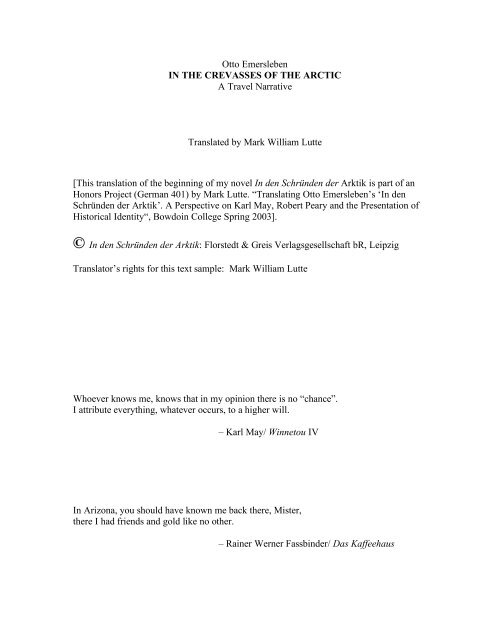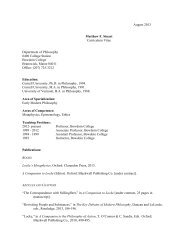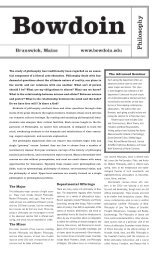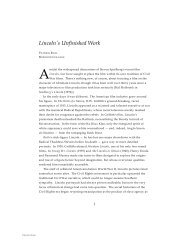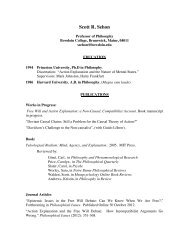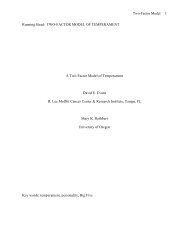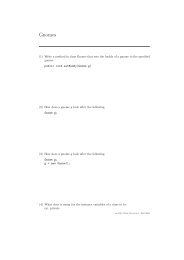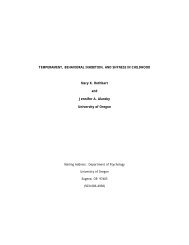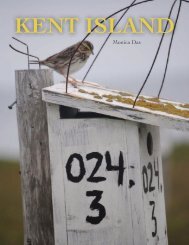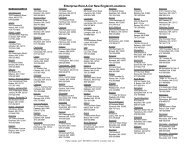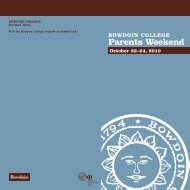Otto Emersleben IN THE CREVASSES OF THE ... - Bowdoin College
Otto Emersleben IN THE CREVASSES OF THE ... - Bowdoin College
Otto Emersleben IN THE CREVASSES OF THE ... - Bowdoin College
Create successful ePaper yourself
Turn your PDF publications into a flip-book with our unique Google optimized e-Paper software.
<strong>Otto</strong> <strong>Emersleben</strong><br />
<strong>IN</strong> <strong>THE</strong> <strong>CREVASSES</strong> <strong>OF</strong> <strong>THE</strong> ARCTIC<br />
A Travel Narrative<br />
Translated by Mark William Lutte<br />
[This translation of the beginning of my novel In den Schründen der Arktik is part of an<br />
Honors Project (German 401) by Mark Lutte. “Translating <strong>Otto</strong> <strong>Emersleben</strong>’s ‘In den<br />
Schründen der Arktik’. A Perspective on Karl May, Robert Peary and the Presentation of<br />
Historical Identity“, <strong>Bowdoin</strong> <strong>College</strong> Spring 2003].<br />
© In den Schründen der Arktik: Florstedt & Greis Verlagsgesellschaft bR, Leipzig<br />
Translator’s rights for this text sample: Mark William Lutte<br />
Whoever knows me, knows that in my opinion there is no “chance”.<br />
I attribute everything, whatever occurs, to a higher will.<br />
– Karl May/ Winnetou IV<br />
In Arizona, you should have known me back there, Mister,<br />
there I had friends and gold like no other.<br />
– Rainer Werner Fassbinder/ Das Kaffeehaus
CHAPTER I<br />
The Congress Travels<br />
Like every human being I have an external and an internal life. My external<br />
personality is named Karl May and busies itself with writing. My internal personality has no<br />
name; it makes itself known through my books. I have traversed the globe from the lands of<br />
the East to the Far West. Part of the adventures on those expeditions found expression in my<br />
writing. Who could defend this claim with more justification and right than I: The earth is<br />
far more than a thousand day-journeys long, and its width is just as great.<br />
Not long ago I reached the Great White North, a part of the world, with which I had<br />
not yet become well acquainted. It all began with my wife and I boarding a ship headed for<br />
New York * in the summer of 1904. Following my numerous travels to North America, I was<br />
especially looking forward to this journey, as it was supposed to finally bring me long-<br />
awaited recognition among geographical experts. In September of that same year,<br />
geographers from all corners of the world gathered together for their World Congress in the<br />
American capital of Washington – for the first time outside of Europe. I had prepared a<br />
presentation on the topic: “The Spread of the Common Mulberry Tree in the Valleys of<br />
Kurdistan under Special Consideration of Incidences in Manglana and Gumri as well as in<br />
the Valley of Sab el Ala.” Since the death of my friend Winnetou, the West of the American<br />
continent was disappearing more and more from my range of interests, so I was pleased that<br />
* Translator’s note: written as Neuyork in original text; a spelling typical to that era
this golden opportunity presented itself to show Klara – we had just married the year before –<br />
the New World. My Bowie knife, Henry carbine, and bear-killer consequently stayed at<br />
home, just like Winnetou’s silver rifle * , which I had taken into my own care after an attack<br />
by enemy Indians at the grave of the Great Chief of the Apaches.<br />
The days before the departure from Radebeul were filled with busy doings up to the<br />
last instant. Arrangements had to be made concerning this author’s works and home for the<br />
extent of our absence; friends demanded the opportunity for a proper farewell. One’s<br />
enemies also had to be considered, getting together right at that moment and planning new<br />
attacks against me, as we were meeting our travel arrangements. I trusted the defense of my<br />
cause to a few capable lawyers and to the care of my publisher, and our fate on the sea to a<br />
solid travel enterprise.<br />
During the twelve-day crossing to New York I made the acquaintance of a young<br />
German by the name of Rudolf Franke, with whom – although myself a Saxon, and he being<br />
from Braunschweig – I saw perfectly eye-to-eye. Little Heart ** , a name I used for my dear<br />
Klara, shared my enthusiasm for this dashing young man. In his profession as a businessman<br />
he wanted to try his luck in the New World, something his homeland had denied him up to<br />
now, like so many others. He mentioned that the reading of a report from an upright man<br />
named Kara Ben Nemsi regarding his experiences in wild Kurdistan, where this man – yes,<br />
even as a salesman had traveled about, was not altogether unrelated to his decision to<br />
emigrate. As my Little Heart, with eyes closed, silently nodded in approval, I admitted that I<br />
was, in fact, this Kara Ben Nemsi, and trustingly laid my hand on the shoulder of my young<br />
countryman.<br />
*<br />
Translator’s note: These weapons of Karl May are better known as Bowiemesser, Henrystutzen, Bärentöter,<br />
and Winnetou’s Silberbüchse.<br />
**<br />
Translator’s note: written as Das Herzle in original text
Franke’s astonishment was not slight. With his mouth open he drew back from my<br />
hand, and whispered to me, listening intently for a response: “That means you are…”<br />
“I was,” I said. “Yes, I was indeed Old Shatterhand, and now that I’m again going to<br />
America, the world still calls me Scharlih. * I happily respond to that.” To completely<br />
convince him, I gave him the full title of my presentation at the coming congress.<br />
“So it’s not Kara Ben Nemsi who is giving the presentation?” Franke asked. The<br />
disappointment in his words could not to be missed.<br />
“Of course he’s giving it,” I said, with the encouraging gesture of placing my right<br />
hand on my breast, “but only as a private scholar, and under his legal name.”<br />
Unfortunately, we had to part ways with Franke immediately upon disembarking the<br />
ship, and for him the thorny path of the immigrant began.<br />
Back home, in the countries of the Old Continent, the majority of the congress’<br />
participants might have been considered armchair scholars – the conference’s program made<br />
every single one a discoverer of America. For the congress traveled. Leaving Washington,<br />
where the congress opened, we soon came back to New York. There we had another<br />
encounter with our “old” friend Franke. In the meantime he had been searching for work; he<br />
already had – as he happily reported – a potential position as purchasing and economic<br />
manager in a large hotel. We dined together in a nice little spot in Hoboken (on the outskirts<br />
of New York), a harbor known as ‘Little Germany’. The sauerkraut that was served<br />
alongside my Kalbshaxe, prepared with steamed onion slices, nutmeg, and yellow-gold<br />
bacon-drippings, will remain unforgettable to me.<br />
* Translator’s note: This is the nickname given to Old Shatterhand by the title character of Winnetou I (page<br />
545, original edition of 1893, available at http://www.ub.uni-bielefeld.de/KarlMay/winnetou/ ).
On the morning following this fortunate encounter, Klara and I, along with the rest of<br />
the members of the congress, boarded a roomy river-steamboat. We traveled up the Hudson<br />
River, and finally went over land to Niagara Falls and to Chicago. The congress still met,<br />
tirelessly, even while underway. In every location along the voyage these meetings took<br />
place, plenary as well as in work-groups, and complete with banquets and cocktails. Local<br />
bands of geographers were assembled to greet us, and with them came businessmen,<br />
diplomats, teachers, and military officers (even in the so-called ‘New World’ one subscribes<br />
to the odd belief, that violence and extermination are acceptable means for reaching humane<br />
ends).<br />
At the meetings, members praised each other with compliments, exchanged offprints<br />
of their articles, information, addresses; there were bows and countless discussions among<br />
colleagues at the fringes of the crowd. My wife enthusiastically took part in the congress’<br />
lady’s program, and besides experiencing the receptions and banquets, which she attended<br />
with me, she also got to know the schools, prisons, soup-kitchens, and libraries of this great<br />
republic. She did not withhold her astonishment from me, concerning how unfamiliar the<br />
people of this country were with my books. They were, after all, the origin of everything she<br />
had known about America up to this point, those very books of mine.<br />
We traveled comfortably. In Pullman cars for the most part, now and then on<br />
steamships or with horse and buggy. At one point we were even expected to enter a cage, in<br />
order to descend into and view a coalmine. What I especially treasured, were the<br />
possibilities to personally meet with these geographers and travelers. I certainly felt, upon<br />
these opportunities, a sharp distinction between those among the group that purely collect
facts and myself. For me, writing has never been a question of fame whatsoever, whether<br />
before or after my death. Above all else, questions concerning all of humanity were my<br />
focus. The possibilities of destruction have become so virulent, that no one is able to control<br />
them any longer, and instead we are all controlled by them. Mankind has to come to the<br />
realization, that it must rise and head toward the realm of noble humanity; each one of us in<br />
our own right. What can each individual do, to prevent the threatening catastrophe? My<br />
books are parables, in which I attempt to provide an answer for such questions. Helpless as<br />
the teller of a fairy tale. What my nemeses at home resentfully call the ‘Karl-May-Problem’<br />
is actually nothing more than the problem of all humankind, on which countless millions<br />
have already worked, without reaching any tangible conclusion. They accuse me of<br />
plagiarism and fraud only because they do not understand this.<br />
The president of the congress was a well-known polar explorer: America’s Robert<br />
Peary, who had attained the rank of commander in the Navy (although he never commanded<br />
any ship of war). In one of his addresses he spoke of the distinct “migratory character” of<br />
our event. The newspapers reported on the story intensely, not only mentioning the opulence<br />
of the banquets with foreign dignitaries and representatives of the American government, but<br />
also in their ‘social events’ columns on the multitude of peripheral activities along this great<br />
journey.<br />
I gave my lecture in St. Louis, the last stop.<br />
There the opportunity arose to become better acquainted with Commander Peary,<br />
himself. Like me, he was the child of poor parents – to be more exact: his father died when<br />
he was only three years old. His poverty was not my poverty, however. Ultimately, his<br />
mother made it possible – although through horrible difficulty – for him to be educated as a
civil engineer. He seemed to be very proud of the fact that she lived to see the dawn of his<br />
fame as a polar explorer. She died only a few years ago. Peary proved to have not only a<br />
profound knowledge of the Arctic, but knew my entire body of work as well. He was also a<br />
man who knew how to set himself in the right light concerning the press. He had, as he<br />
repeatedly assured me – and soon I could convince myself, that this assurance was certainly<br />
correct – excellent connections with the American president, Theodore Roosevelt. Thanks to<br />
these connections, Peary was for now totally free from all other duties in the Navy, and at the<br />
same time, he practically had a direct presidential order in his pocket to conquer the North<br />
Pole for his country at all costs.<br />
In his speech at the closing of the congress, Peary spoke of a time of big things, in<br />
which we are living. And in New York, at the Gala reception for the foreign guests, he<br />
elaborated on his own plans to the astonished and attentive group of experts: after having<br />
spent nearly twenty years of his life in the wide expanses of the Arctic, next summer he<br />
would, using a specially-built, polar-cruising steam-sailer, push as far as possible into the<br />
heart of the polar island-world and from there with dog-sleds and Esquimos – his Esquimos,<br />
as he often said – he would reach the North Pole. A keel had already been laid for the ship<br />
that would bear the name of President Roosevelt. “Shall I win?” he asked meaningfully, with<br />
both hands cast up in the space before him, much like a priest. “God knows. I hope and<br />
dream and pray that I may. And if I do not, some one else will. There is no higher, purer<br />
form of rivalry than this polar quest.”<br />
Peary was without a doubt imposing in appearance, there in his dress suit, which had<br />
been excellently tailored. The tall, massive yet thin figure; the penetrating, sharp eyes,<br />
whose quick movements seemed to flee from nothing; the powerful, bushy moustache – I
could envision him in his fur costume, which he wore on every voyage to the world of eternal<br />
ice. He must not have looked all that different from a walrus then. Dinner had just ended as<br />
he gently took me by the arm and asked, smiling earnestly, “Doctor, how is it, that you of all<br />
people have not yet traveled the Arctic?”<br />
I left my wife in the care of the German ambassador. “Maybe I just haven’t written<br />
about it yet,” I responded ambiguously. Peary pulled me gently, but pointedly aside.<br />
“Honestly, my dear Peary, what does this mean? Paper, as we both know, is patient. And<br />
other than that, I’m not yet finished with all my travels.”<br />
“That is exactly what I’m implying,” he said, giving me a wink. His face rapidly took<br />
on an earnest, business-like expression. “You know, at first I was also not drawn to the ice.<br />
Not even to the Pole. All that came much later. As a young Navy lieutenant I first romped<br />
about the isthmus of Nicaragua assigned to surveying. Back then we Americans wanted our<br />
own connection between the great seas of the world –“<br />
“I know, I know,” I conceded. What was he driving at? Just now, because we were<br />
walking closely together, I noticed that he slid along more than he stepped. It was probably<br />
to conceal a slight limp that otherwise would have been unavoidable; after all, a few years<br />
ago he had to have almost all of his toes removed on account of severe frostbite. As soon as<br />
we stood apart from the other small groups, he paused, stared me straight in the eyes, and<br />
said: “Short and sweet, I’m not the youngest anymore. This will be my last attempt, Doctor.<br />
And I should like it if you accompanied me. Do you have a command of the Esquimo<br />
language?”<br />
Overcome with surprise, I let his arm fall from mine. “Of course Inuit is among the<br />
fifty or so languages that I have to offer,” I hurried to assure him. Everything we had heard
about expeditions and daring plans in this week of the congress was suddenly wide-awake<br />
inside of me. Each of us had our own reasons for getting involved. Was it not all just a big<br />
gamble? The stakes were high to be sure, and quite a few explorers had already paid for their<br />
obsession with their own lives. But it was worth it – provided that one achieved a great<br />
score.<br />
right?”<br />
“As far as age is concerned, what should I say? You’re – let me guess – not yet fifty,<br />
“Certainly not, although it won’t be long.”<br />
“And I am presently sixty-two, you see.”<br />
“And – you’re a newly wed.”<br />
I nodded humbly. “Alright then,” Peary bellowed in satisfaction. He lifted his arms<br />
up joyfully, leaned back slightly, anxiously keeping his balance, and said: “Assuming this<br />
pleasant circumstance is not somehow a hindrance, I hereby formally invite you to join me<br />
next summer on board my hopefully-completed vessel. Together we will sail up to the<br />
jumping-off-point for my dash to the Pole.”<br />
that?”<br />
your wife?”<br />
I stopped short, my indecision quite apparent. “Hindrance? What do you mean by<br />
“Well, would a – let’s say – several-week-long separation meet with the approval of<br />
“My wife would have nothing against this plan. But tell me, didn’t your wife<br />
accompany you more than once to the North? She even wintered-over with you once, if I<br />
remember correctly.”
“Several times, several times. But I should like to spare you that, believe me. You<br />
could return to the States with the relief ship, which will be sailing along with us as our<br />
tender. And if you want, go ahead and bring your wife along. In any case, the invitation<br />
goes for the both of you.”<br />
As he continued speaking, suddenly Peary’s Negro servant appeared. He stood at<br />
attention, keeping a proper distance, and audibly cleared his throat.<br />
“What is it then, Henson,” Peary asked indignantly.<br />
The Negro had an open, dutifully keen smile stretched across his face. He removed<br />
his white-gloved hand from his mouth, and responded: “I beg your pardon, Sir. Your<br />
presence is requested at – at the telephone. The President of the United States would like to<br />
speak with you.”<br />
“Then you will have to excuse me,” said Peary smiling, with a bow to me. “Carefully<br />
consider my proposal. The offer stands.” I took this chance to thank him, and I promised<br />
that I would give my answer by the end of the congress. Then I could hear him, as he moved<br />
away, barking at Henson: “Where is the thing, then? This fellow is going to start getting<br />
pushy.”<br />
A few days later everything had come to a close and we had happily survived the<br />
congress. The resolutions and the reports were adopted, and the busiest of the participants<br />
even took off on a train trip to Mexico. Robert Peary could be satisfied with the outcome.<br />
He had received the endorsement of the world’s leading geographers for his claim that<br />
exploration of the Arctic, particularly of the regions close to the Pole, was primarily an<br />
American matter. Or, as the text of the resolution itself read, it represented “a more<br />
immediate interest to the people of North America.” This was a slap in the face for the polar
explorers of other countries – but I must confess, I, too, voted for this closing line, all the<br />
while keeping Peary’s invitation in mind, which I certainly did not wish to endanger. My<br />
Little Heart had given her approval to this undertaking, and I immediately approached Peary<br />
to signal my grateful acceptance of his proposal. He promised that he would notify us in the<br />
coming summer of the exact place and time of our departure.<br />
In St. Louis, years ago, my way to the Wild West had begun. From here I set out as a<br />
surveyor with Ol’ Sam Hawkens – as one who everyone believed to be a greenhorn * , because<br />
that was the first time I ever came across highwaymen and redskins, and never before had I<br />
taken aim at a buffalo with a gun. To the surprise of the westmen ** , I was skilful and brave,<br />
quite different from what was expected of a true greenhorn. As if this had all just been<br />
yesterday, I recalled the red roan, which I broke for that first journey, which was<br />
consequently given to me as a gift by my patron Mister Henry, the gunsmith. I suddenly felt<br />
the twenty-five-shot carbine on my back, which the old rifle-maker had created especially for<br />
me, because I reminded him of his long lost son. And I remembered the first time I returned,<br />
my fame as Old Shatterhand preceding me –<br />
In the meantime the city had drastically changed. The run-down harbor from before,<br />
where many a ship owner had collected his freight fees with the help of a revolver, had<br />
become a quaint little city with clean freight yards and smoke-belching chimneys. And had I<br />
not also become someone completely different? The greenhorn of yesterday had grown into<br />
* Translator’s note: From this point in the text on, any English nouns and short sentences that appear in italics in<br />
this translation signify a word or passage that was written in English in the original text (Please note that this<br />
does not pertain to English place names or character names, and pronouns written in italics are for the purpose<br />
of emphasis).<br />
** Translator’s note: “Westman”, although not an actual word in English, is a term found in Karl May’s works<br />
(Westmann or pl. Westmänner, Westleute).
an author of several dozen, highly praised travel books, praised not only by the experts, but<br />
also by a wide readership. So my revisiting of St. Louis understandably gave me great<br />
satisfaction, as it supplied me with an excessive feeling of strength and power in my battle<br />
against those envious and hateful back home. How I had grown in the years since then, and<br />
how trivial and insignificant their accusations had remained! Here on the shore of the mighty<br />
Mississippi, this gigantic, never-tiring river, I first realized how banal and unimportant their<br />
yapping was. As they attempted to fool millions of my enthusiastic readers, I supposedly<br />
was never in those lands, about which I had written. Rather, they alleged that everything I<br />
had described as personal experience was simply plagiarized from somewhere. Whoever<br />
makes such a claim, exposes his inadequacy as a literary connoisseur from the very start.<br />
Has Goethe ever been accused of being a swindler, because he never committed suicide<br />
himself, and thus could not have been in a position to present the letters of the sorrowful<br />
Werther? Whoever does not know how to read my travel narratives should not blame me for<br />
that. It is as if someone dared to accuse Defoe of not supplying precise enough coordinates<br />
for the Robinson island. As if these things were of any importance!<br />
As a young private-tutor I once came to the Mississippi. Sure, Henry the old rifle-<br />
maker had died in the meantime, a man to whom I was so very grateful. The sons of the<br />
honorable horse-dealer, Corner, from whom I received my red roan, still ran the business of<br />
their father. They, in the meantime, had become respected businessmen themselves. From<br />
the family of German immigrants, with whom I lived and whose children I taught, only<br />
“Little Emmy” remained in the area – back then she was five years old. In the meantime, she<br />
had become a grandmother several times over and had been widowed. (She had married my<br />
then-replacement for the position of private-tutor, a man named Black). We tracked her
down on the farmyard of one of her daughters and Emmy led us through her miniature<br />
kingdom. Upon our departure she gave my wife a kitchen knife, which her mother, as she<br />
assured us through her tears, had used to cut Peterli * in the old homeland. Klara looked at<br />
me, baffled, and before giving her thanks she wanted to know what was meant by Peterli. I<br />
nodded to her encouragingly, “It’s what we call Petersilie back home, my love.”<br />
Following aforementioned riding adventures toward the West, I had often crossed the<br />
surroundings of St. Louis on later visits while hunting. The extended woodlands in the lower<br />
reaches of the Missouri would also have given me this chance now. However, alarming<br />
telegrams from home unmistakably called me back. My publisher, Mr. Fehsenfeld, insisted<br />
that things not be made more complicated by my elongated absence than they already were.<br />
My enemies, he cabled, had obviously gained ground on me through careful preparation of a<br />
new battle. By now there was a palpable readiness in the press to interpret my silence as an<br />
admission of guilt and my disappearance from the scene of disputes as an escape. In his<br />
telegrams he urgently requested that I return to Germany as soon as the congress ended.<br />
I booked the return passage. Before we boarded the train, which was supposed to<br />
carry us from the Mississippi to the East Coast, Klara and I had yet another unforgettable<br />
encounter. On our last evening in the hotel, a Mister Alexander D. Fisher had himself<br />
announced to us; he wished to speak with me. Now, the name Fisher, in both Germany and<br />
in America, is very common, but no concentrated recollection whatsoever could help: I knew<br />
of no Alexander D. by this name. Who could describe my astonishment, as I was greeted in<br />
the loud hotel lobby by an old friend, whom I had not seen since Winnetou’s death: the stout<br />
* Translator’s note: Peterli> diminutive of “Peter”: southern German transformation of ‘Petersilie’ (from<br />
Grimm’s Deutsches Wörterbuch, vol. 7, 1889), meaning ‘parsley’ in English
Fred Walker. In those days he had hunted the leader of a band of rail-troublers and bush-<br />
headers in the service of a renowned detective agency. And this agency was, if I remember<br />
correctly, stationed in St. Louis. No wonder then, that I had met him here of all places. That<br />
is what I thought, anyway.<br />
Smiling, we shook each other’s hand. I immediately sent for Little Heart. My wife<br />
was surprised to be introduced to a Mister Walker, as she had recently witnessed my<br />
confusion back in the room, as we puzzled over the name Fisher.<br />
“Oh yeah,” Walker explained, the moment Klara mentioned this to him, “that’s all<br />
part of the job. I just didn’t have any other business card on hand.”<br />
“So, you’re still in the same line of work? Still a detective on the trail of<br />
highwaymen?”<br />
“Yes and no. The same line of work, yes, but after highwaymen, no. And also not in<br />
the Wild West. Since there isn’t much of the old frontier left, westmen now have to resolve<br />
their differences before an orderly court of law.”<br />
“So you’re a lawyer? The portly Walker, an attorney! Or is it – judge?” I looked at<br />
him in disbelief.<br />
“What’s wrong with you, Charles? If I were a lawyer, would I have to adopt another<br />
name every now and then? To be honest, there are just too many people around here.” Good<br />
naturedly, he directed us, with both arms outstretched, to a quieter corner of the Foyer. “No,<br />
no, Fred Walker is still the same hawk-eye you got to know in the Rockies.”<br />
“The same one I left behind with those German farm families, at whose rescue from<br />
unexpected imprisonment Winnetou finally met death. What was the name of the place<br />
again?”
“Helldorf Settlement. Are you getting old, Charles?”<br />
“Right, Helldorf. But spare us more torture.”<br />
“I am –” Walker leaned forward to Klara and me, and whispered, “ – currently on the<br />
move under secret instructions from our President Roosevelt. Teddy Roosevelt, as we like to<br />
say.”<br />
“I’ve heard that he’s quite a westman. He’s reported to have the most unusual things<br />
in his trophy collection. Is it all true?”<br />
“It’s all true, Charles, it’s all true. Grizzly hides and lynxes and mountain lions and<br />
bighorn sheep and the impressive racks of old moose, as many as you can imagine. He shot<br />
them all himself. And yet –“<br />
“So that’s it –“ interrupted Little Heart with eyes wide open, “you’re his scout, so to<br />
speak, looking for his next hunting possibility.”<br />
“Oh no, Ma’am. Or at most in a very figurative sense. What the president does in his<br />
free time is not my business. I am, rather, one of his closest foreign policy advisors. With a<br />
secret mission. And my hunting ground is the world. Since there is no longer any frontier to<br />
the Indian land, westmen settle their Showdowns in court. Many things have changed since<br />
then.”<br />
“I understand. The simple ‘Go West!’ mentality is gone. In other words, this land<br />
must look around for new possibilities of expansion.”<br />
“You hit the nail on the head, Charles. As always. We are all over the world, with<br />
intrigue and influence, and in emergency situations also with money or even through<br />
intervention. You must know, my dear lady, that I have lived through some difficult
situations with your husband, and that we’ve helped each other out of some real troubles.<br />
That’s why I’m not mincing words.”<br />
reach.”<br />
“So what are you doing in St. Louis, Fred? I mean – with all your new found global<br />
“This is, let’s just say, more of a private, little side trip before it all starts up again. I<br />
just came from Paris, from a secret conference of the Russian Czar’s enemies.”<br />
“You mean – nihilists, anarchists? Bomb-throwers?”<br />
“Yes, ma’am. Nihilists, too. Teddy has far-reaching ambitions. He must be<br />
informed of everything, if he wants to play along. Now the topic is how everything stands<br />
with the Czar. Since Russia and Japan find themselves at war –“<br />
It was clear to me, that Walker was not going to discuss the hottest details, so as soon<br />
as he broke off his sentence, I didn’t inquire any further. Even Little Heart demonstrated the<br />
utmost sensitivity at this point, and on her request, Walker confessed to us the reason of his<br />
private side trip to St. Louis: “An old flame of mine – Liz. We knew each other back when I<br />
was with you, Charles, out West with your friend Winnetou.”<br />
“And she has waited for you all these years? Won’t you introduce us to your Liz,<br />
Fred? I mean – although the time is now quite short,” Klara insisted.<br />
“You are leaving tomorrow?”<br />
“With the early train to Cincinnati. There we have a connection to New York.”<br />
“Than nothing can come of this. Liz had to leave suddenly today for a week in<br />
Memphis. I brought her to the steamboat only a moment ago, and the farewell took quite a<br />
while. To Cincinnati, you say?”<br />
“Yes, why?”
“I have to take that train, too. I gotta go to Washington.”<br />
“Well, then we have time enough to chat.”<br />
“But, one question you must answer for me right now, Fred,” my wife interjected.<br />
“And that would be?”<br />
“So you never married your Liz, did you?”<br />
“When could we, ma’am? One of us is always on the move. Sometimes the both of<br />
us, as you can see.”<br />
“Oh, is she just as much of a traveler as you? And like my Scharlih?”<br />
“So you’re not the traveling-type?”<br />
“I’m only now getting the hang of it.”<br />
Walker nodded absent-mindedly. “Tell me, Charles, things were discussed at your<br />
geographic congress… an arctic continent about the size of Australia – what do you think of<br />
that?”<br />
“Oh – what these pen-pushers and map-dreamers won’t come up with next! Someone<br />
somewhere on the north coast of Alaska found a piece of driftwood in the wrong place, and<br />
now that means, that the currents have shifted due to a huge land mass–“<br />
“That no one has yet seen! This idea is enticing, I have to admit.”<br />
“These people can’t hold their ink and they just keep writing. What makes this<br />
situation so complicated is that serious polar explorers are among them. I believe, even your<br />
Peary, for example.”<br />
“You believe Peary is serious?”<br />
“Don’t you?”
“Between you and me, I have my doubts. He’s too bombastic for me and when he’s<br />
alone with Teddy, he acts like a charlatan. Too often he tells the president what the guy<br />
wants to hear. And because of this, of course, he gets what he wants. However, for<br />
professional reasons I have to take him seriously. If there actually is another continent of this<br />
size to be discovered on Earth, even if it’s on the Pole, than America must be involved. If we<br />
are, then we don’t need to conquer such a continent. You don’t think very highly of this, as I<br />
see it.”<br />
“No, no I don’t. Neither of fantasies of that sort nor of conquests in general.”<br />
Suddenly, a great many connections became clear to me. Peary’s leave of absence<br />
from his routine duties in the Navy, and the official order to discover the North Pole, instead.<br />
Roosevelt must be crazy about the engineer; this man was his cheapest dreadnought. “I can<br />
plainly see, Fred, the three of us won’t grow tired of one another on our train trip.” With that<br />
we parted, trusting that we would see each other again soon.<br />
And who did not appear the next morning on the platform? Fred Walker. Instead of<br />
his company, we enjoyed that of a physician from Brooklyn, Dr. Frederick Cook. Like<br />
myself, he took part in the congress and also gave a lecture, however I had not yet had the<br />
chance to meet him. This was now made up for extensively, as the rarely undulating<br />
landscape of the Ohio River valley flew past the compartment window.<br />
“Are you also a physician?” he asked, as we became acquainted, and I responded:<br />
“No. I earned my doctorate in the humanities.” Cook was the son of German immigrants by<br />
the name of ‘Koch’. His father – already a physician – left the old home near Hannover after<br />
the Revolution of ’48 and was able to found a new existence in the State of New York. The<br />
family of young Cook (he was a little older than Peary) had also lost its provider one day,
and Cook had to contribute at an early age to their communal survival. By the age of thirteen<br />
he was working in a glass factory.<br />
To Klara, Cook was extremely polite, a real gentleman. The despair of his loneliness<br />
after the loss of his first wife, who had died in childbirth, had made him a polar explorer, he<br />
explained jovially. His dreams of foreign lands, in which he sought consolation day and<br />
night, lit up one day like a flash in the focus of a convex lens, as he read in the “New York<br />
Herald” about the possibility of participation in Peary’s first expedition to northern<br />
Greenland. He immediately hurried to Peary, to secure himself a place in this undertaking.<br />
Success. Peary appointed him expedition-doctor and anthropologist without hesitation.<br />
Later, upon the publication of Cook’s ethnological research, which had been completed<br />
during the journey, friction seriously began between the two. The long-trusted relationship<br />
from the first venture onto the ice was never able to recover. After that he went his own way.<br />
“Oh, so you’ve known Commander Peary that long, my dear doctor?” Klara’s<br />
question sounded somewhat stiff, given the bitterness and insult, which all of a sudden was<br />
palpable in the stale air of our narrow compartment.<br />
“Yes, ma’am. As a matter of fact, he was just a lowly lieutenant back then, an<br />
engineer on top of that, simply put: a civil employee, someone who the true Navy heroes<br />
didn’t even take seriously. However, Peary was ambitious beyond all measure. And ruthless<br />
toward everyone.”<br />
“Do you mean, even toward his mother? I only had a short opportunity to converse<br />
with him, but his mother seemed to…”<br />
“You’re right about that. Excepting his mother. He truly thought of her as a goddess.<br />
She died when he was back in Greenland, after my time with him. I had just turned back
from the other side of the globe, from the Antarctic ice-desert. In the meantime, it had<br />
become clear to me that the polar question – whether north or south – was no place for<br />
adventure, as many make it out to be. And also not a pure matter of business. My<br />
experiences with Peary had suggested this all too easily.”<br />
“What is the polar question then?” I asked. I would have gladly had more<br />
information on the origins of the two men’s differences. The hint that Peary was driven by<br />
business had already reached my ears during the congress.<br />
“The question of the Pole is a scientific problem. For the most part, anyway.”<br />
“Not also a – gamble?”<br />
Cook answered evasively. His exact words, I forget. But I do remember the<br />
adventure on board the steamer “Belgica”, which he mentioned at this opportunity. Shortly<br />
before the turn of the century, Cook wintered-over on this ship in the Antarctic. His name,<br />
like that of the young Norwegian Roald Amundsen, who also took part on that expedition,<br />
became known over night among the experts worldwide: the first wintering-over in the<br />
region of the South Pole – not voluntary, of course, but the first nonetheless. The ship was<br />
fully unfit for such intentions, it was simply a modified sealer. At that time I had only heard<br />
fragments about the event, it did not particularly interest me back then. Through a chain of<br />
inconvenient occurrences, the “Belgica” froze solid in the pack ice. Had Cook weighed his<br />
options as a gambler, he would have hardly gotten himself involved in such a risky<br />
undertaking.<br />
“Is Peary still so ambitious to this day? And – so totally ruthless?” Little Heart<br />
seemed to guess my train of thought and discreetly guided the conversation back to the<br />
project, which interested the two of us for the coming year.
“Yes! Yes! Still just like that. Ambitious and ruthless. One of these days in the<br />
Navy, believe you me, he’ll bring these traits with him to an Admiralty.”<br />
“I will remind you of this prophecy, doctor.”<br />
“To know that, is uncommonly flattering for…“ Cook never finished his sentence.<br />
Ear-splitting clamor filled the air, at first the blast of a detonation, then the noise of<br />
splintering glass, wood, tin, and the grinding of twisted rails and bridge supports to the limits<br />
of torsion, before they burst apart with a loud, whip-crack report. By my estimation, we had<br />
just reached the first Ohio River Bridge.<br />
Our car rose up and then crashed, the others following, into the depths. It ripped me<br />
out of my seat with indescribable power. I attempted, right hand outstretched to my Little<br />
Heart, to maintain balance. My wife had just been sitting at my side, but my hand, when it<br />
finally obeyed my will, grasped in the emptiness. Suddenly I saw the one of our oversea-<br />
trunks flying at me at eye-level. Upon that, I lost consciousness.<br />
When I awoke, I laid, wound from head to toe in white bandages, on a hospital bed.<br />
Klara sat next to me, dressed in hat, veil, and blouse. Smiling, she laid her left hand on my<br />
tightly bandaged arm. “What happened?” I said, and as soon as the words had left my<br />
mouth, I realized how dumb my question must have sounded.<br />
“Russian terrorists blew up the Ohio River Bridge before Cincinnati. Just as our train<br />
was making the crossing.”<br />
“Russians? The Ohio River Bridge? Why?”<br />
“They had targeted your friend, as the newspapers see it.”<br />
“The portly Walker?”
“Yes. He may have gotten himself too deeply involved in things when he was in<br />
Paris; things that didn’t concern him. Anyway, this seems to have been the opinion of the<br />
people who blew up our train. I can’t quite work this all out in my head. Because Walker –<br />
or Fisher, or whatever his name is – was not even with us on the train at all back then. At<br />
least, the two of us know that for sure.”<br />
“Back then? – What do you mean by that? When did this all happen?”<br />
“Four weeks ago, Scharlih. Half of that time you drifted between life and death. But<br />
now, according to the doctors, the worst is over.”<br />
“And you, Little Heart? What happened to you?”<br />
“I only had a few scratches. Those healed a long time ago.”<br />
She smiled at me. I smiled back, as best I could.<br />
“And – Doctor Cook?” I asked anxiously.<br />
“You have him to thank for your life. He – despite several broken ribs and a terribly<br />
bleeding wound on his forehead – pulled you from the wreckage. In the meantime he has<br />
recovered and awaits us in New York.”<br />
And so my past caught up with me, taking the shape of my old trail-companion Fred<br />
Walker. Where would it be lurking next time? Was there no escape at all?
CHAPTER II<br />
An Order from the Great Father<br />
The messages from home grew more and more demanding. Involuntarily, I had lost<br />
much precious time. Meanwhile, Fehsenfeld wired that my enemies had targeted more than<br />
just my writing as a danger for youths, as pornography and generally immoral. Now, they<br />
had announced the publication of Saxon police files, in order to harp on what I assumed were<br />
long forgotten previous convictions from my younger years. With that, my believability was<br />
supposed to have doubt generally cast upon it – if they succeeded, no one would ask<br />
anymore, if I had ever been to Kurdistan or not. A convict, what can be expected of such a<br />
man! This is how people would now react. I cabled back immediately, and asked who<br />
“they” were, and informed my publisher, that the doctors believed I should remain in<br />
America for a few more weeks, if not months. Yes, at present I was not even suited for the<br />
remainder of the train ride to the East Coast.<br />
The answer came immediately. Fehsenfeld promised to try his best even without me;<br />
he did not, however, guarantee success. Libel suits – I would no longer be able to get around<br />
such things – were not something that a representative could fight out. That is what these<br />
questions of honor were all about. Concerning names – in addition to the lawyers of my<br />
former publishers and the well-known muckrakers of the press at large – one in particular, a<br />
journalist from Charlottenburg near Berlin, was notoriously emerging in the papers: Rudolf<br />
Lebius. He was the one who threatened the publication of documents from the Saxon police
archive. In order to really push the infamy over the top, he even announced that he would<br />
make my divorce papers public.<br />
I knew Lebius. A shady type, and capable of anything. He would neither stop at<br />
character assassination nor the falsifying and fabrication of documents to reach his goal.<br />
Only a year ago he attempted to blackmail me. Back then it concerned a ten thousand Mark<br />
“loan”, which he demanded from me. Should I not cooperate, he threatened to give “horribly<br />
incriminating material,” as he called it, to the press. Now he was following through, because<br />
I certainly did not give him any money back then, and instead threw him out.<br />
Due to the train accident, my hands were tied for the time being. My injuries were<br />
not causing me pain any more, but I felt – with the additional paralysis from the brisance of<br />
the latest news – tired and limp. I slept plenty. From my bed I looked through my hospital<br />
window onto broad meadows on both sides of the Ohio. From this point on, the river ran its<br />
course to the southwest and unstoppably to the Mississippi. As soon as my injury subsided<br />
and I could take my first steps, my wife took me by the arm and pulled me gently to the<br />
outermost corner with windows. “There!” she said. “You shouldn’t think that you dreamt all<br />
of this.” Little Heart pointed to the remains of the bridge, which had escaped my sight until<br />
now. An arc of iron jutted diagonally out from the water’s surface into the lead-gray sky.<br />
The days were full of depression. This feeling, to be helpless and at the mercy of the<br />
effects of untamable powers, away from the pulsing goings-on of the world, crept over me<br />
like seldom before in my life as a traveler. In my youth, oh yes, I did know this feeling well.<br />
I had tried again and again to overcome it through deeds, and in doing so many a time I chose<br />
the wrong path. My enemies attempted to use this against me. And although I have since<br />
become a completely different man, I felt insecure. My homeland so far away, robbed of
each possibility to defend myself against the accusations, unclear about what the future held<br />
– I found that misfortunes concentrated in such an amount could stun even the most hardened<br />
westman. Without my wife I would have been overcome with sheer desperation in these first<br />
few weeks of convalescence. Seemingly fixed among all this uncertainty stood one thing<br />
alone: we were going to have to write off the invitation from Commander Peary to<br />
accompany him in the summer on the first leg of his way to the North Pole.<br />
Little Heart found encouraging words for me every day. And as we finally reached<br />
the point, that the clinic let me go, she said to me with a wink: “Well, hurry up already,<br />
Scharlih. Otherwise we’ll miss the Cincinnati to New York train once again.”<br />
We were picked up at the Pennsylvania Station in Manhattan. I was still not<br />
especially good on foot, and so Doctor Cook had arranged for a coach on the platform,<br />
directly outside our compartment door. He was accompanied by his wife Marie, a friendly,<br />
delicate character. Her appearance let nothing be revealed of her robustness with which she<br />
had to make all the decisions, alone over and over again during the long absences of the<br />
doctor on his journeys of discovery.<br />
The two opened their home to us in a most friendly manner. “Think of yourselves as<br />
being taken in like the closest relatives,” Doctor Cook said, leading us to the guest room.<br />
Once there, he quietly asked: “Should we expect you for dinner in about an hour?”<br />
With a smile under his moustache he waited, until I nodded, and then he silently<br />
withdrew. His face exhibited much warmth, warmth and amity. His heavy moustache<br />
looked much less martial than Peary’s violent seal beard, his eyes also lacked that piercing<br />
stare. Cook’s facial features possessed a friendliness that immediately brought gains for its
earer. I had hardly heard the staircase creak underneath his footsteps when I turned to Klara<br />
and said: “It is embarrassing to be accepted so hospitably by this man.”<br />
“He invited us, so we are here. And we’re staying here, until you are completely and<br />
totally recovered, Scharlih. What should be embarrassing about that?”<br />
summer?”<br />
“Should I tell him, that Peary has invited me - I mean us - on his ship for the<br />
“Given the current state of things, nothing will come of that anyway.”<br />
“We’ll decide that later. What counts now, is the lone fact, that we will also be<br />
Peary’s guests. At least, possibly.”<br />
“Poppycock. The doctor might hold absolutely no bitter feelings against Peary.<br />
What he has said thus far does not portray the Commander in a particularly favorable light,<br />
but what do you have to do with it? The two just can’t get along. At least, not really. I mean<br />
- months long up there on the ice together, I don’t imagine that that’s too easy.”<br />
“Cook seems to be so very different from Peary. Peary is more of a gambler - and<br />
Cook isn’t that at all. He’s more a man of science.”<br />
“But the ambition, which knows no limits and no considerations - that they both have<br />
in common. I will always remember his eyes, as he told us in the train about the eternal ice.<br />
I don’t know anymore if he was right then on the North Pole or the South Pole. In any case<br />
this crazy obsession flickered in his eyes - just like you, Scharlih, when you speak of<br />
Winnetou.”<br />
I had never spent so much time in New York as I did during this visit. I enjoyed the<br />
bustle of this unique metropolis on long walks with my Little Heart. We visited museums,<br />
parks, libraries, theaters, and many other public buildings. Through extensive coach rides I
understood the meaning of America as the melting pot of all nations. Everywhere loud,<br />
colorful throngs.<br />
One afternoon, as I was enjoying the peace and quiet, the maid reported a visitor.<br />
The man, she said, refused to leave. It was, unexpectedly, Fred Walker.<br />
I did not hide my surprise from him. “Look at this fellow – Alexander D.! That means<br />
no one has bombed Mister Fisher to the happy hunting ground yet.”<br />
“I’m sorry you got the brunt of what was obviously meant for me, Charles.”<br />
“Well it certainly wasn’t your fault. So, to what do I owe the honor today? But first<br />
explain how it came to pass, that you missed the train in St. Louis.”<br />
“An urgent cable from Washington delayed my travel plans. Such things go with the<br />
territory in this job.” Just then, as Klara left the room for a short time, he answered the<br />
question more exactly: “The President is whirling with business, he mixes up all his<br />
engagements, he’s been doing this for months now. Teddy’s got something into his head –<br />
but I am not authorized to discuss this with you in more detail. He wants to do that himself.”<br />
“With me?”<br />
“Yes.”<br />
“When would this be? And how did I receive such an honor?”<br />
“President Roosevelt is one of your most enthusiastic admirers in this country,<br />
Charles. I thought you knew that.”<br />
“We’ve only spoken about his being a westman.”<br />
“Well, now you know. He has made an extra trip here from Washington, to meet<br />
with you. During your congress there was no opportunity – I mean, apart from all the official
activity. He puts great trust in the fact that secrecy will be kept. So not a word about this –<br />
to anyone.”<br />
At this very moment the door opened, and Klara let in a maid with a tray. As soon as<br />
we were served, the three of us, balancing our steaming cups and standing around the little<br />
tea table, I said carefully: “I keep no secrets from my wife, Walker. Thus, lay it all out, old<br />
friend. If you don’t, I’ll tell her the reason for your being here myself.”<br />
Walker took a sip. He looked at Klara with a steadfast gaze, whose open face turned<br />
toward him, set down his cup, and said: “Your husband has a fan of cosmic proportions in<br />
my boss, Ma’am. If I may say so.”<br />
“You mean President Roosevelt – Teddy?” As soon as Walker nodded, she<br />
continued: “I felt it, Scharlih, right in the first moment. At our first meeting with our friend<br />
Walker, in St. Louis, as the conversation covered the President’s passion for the West, I<br />
knew it immediately: this relation of souls, this agreement of thoughts –“<br />
“In other words: the President of the United States wishes to speak with Charles. And<br />
to be exact, immediately. This is why I appeared so unexpectedly.”<br />
“This unexpectedness has slowly become part of my conception of you, Freddy. I<br />
may call you Freddy, right, my dear Walker?”<br />
“No problem, Ma’am. I only have to ask, that you tell no one of the meeting between<br />
these two. Not even your host. Just tell them, I am –“<br />
“Leave that to me, Freddy. I understood perfectly. Just tell me where you’re taking<br />
Scharlih. Upon that I insist.”<br />
“Actually –“<br />
“Then I won’t allow him to go.”
there.”<br />
“Very well. The President has a suite at the Waldorf Astoria. I am to bring him<br />
As I prepared myself to depart – silently, I had been following the conversation of the<br />
two – Little Heart came over with a wool scarf. “Take good care of yourself, Scharlih,” she<br />
said. “New York also has frosty January evenings. And you’re still not quite fully<br />
recovered.”<br />
I let Walker lead us out. On the staircase we met no one. Before the house waited a<br />
covered horse-drawn carriage. In a rapid trot we went over the Brooklyn Bridge, that<br />
masterwork of German architecture, which I had so often had the opportunity to admire in<br />
the past weeks. How much the United States owes to German efficiency and the German<br />
spirit of enterprise! With all due modesty, I can claim of myself to have contributed my part<br />
with arguments of action.<br />
The vast hotel foyer lay quiet. Thick oriental carpets and luscious decorated plush<br />
swallowed every sound, and yes, even seemed to slow the movements of the few guests, who<br />
lingered in the hall. Without a word, Walker guided me to the elevator. He pushed a button,<br />
studied the play of little lights and pointers and said, summarizing his observations: “It<br />
won’t take long. I’ll give you over to the Secret Service. They’ve been informed.”<br />
“And when will I see you again?”<br />
“Shortly before the next bang, for certain,” he said laughing. “Who knows?”<br />
I was not at all in the mood for jokes, and so I said as gloomily as possible, without<br />
sounding too bitter: “We had so much more to discuss.” Then the door to the compartment<br />
opened before me. Walker gently nudged me forward. I silently outstretched my hand to the
new escort, a young man in an impeccably pressed three-piece. He was clearly surprised.<br />
He quickly made a move with his left hand, waist-high, to his backside, before presenting me<br />
with his right, and murmured a meaningless salutation, like questions in this country about<br />
one’s health often are.<br />
The elevator glided soundlessly upwards. Only now did I take a look at the elevator<br />
boy and stared incredulously. It just wasn’t possible – but yes: it was Franke. The little,<br />
round cap, held by one strap, had almost slid down to his ear. The entire outfit seemed a bit<br />
too tight. “Goodness, Franke, what are you doing here?” I let my surprise run free. “I<br />
expected to see you again as boss of the cellar or kitchen of this establishment, but not as a<br />
bell-hop!”<br />
“Old Shatterhand – you –?!” Our opening astonishment was quickly overcome. As it<br />
turned out, Franke’s efforts for rapid advancement had not brought him very far, at least not<br />
to the coordinates that were set during our last farewell. But that distressed him little. “The<br />
position of dishwasher I already have behind me,” he declared jovially. “And there’s still<br />
time to play the millionaire.”<br />
“As a solution in the interim you had, if I remember correctly, thought of something<br />
more businesslike. Or have you changed your plans?”<br />
“No, not exactly that. Kara Ben Nemsi’s adventures in the Orient are still my<br />
motivation. But what more could I want - at this job at least I’m always moving onward and<br />
upward. Half of the time, anyway.”<br />
The cabin already slowed; we had reached our destination. In my haste I was not able<br />
to decipher on which floor we were.<br />
“Take care, Franke. I wish you luck further on!”
“Thank you, Old Shatterhand! And my compliments to your lovely wife!” He<br />
bowed closely, then let the door open with a hiss. “But tell me please, where I could reach<br />
you.”<br />
I gave him Cook’s address.<br />
Taciturn I trudged behind my escort along the endless hallway. Before we turned the<br />
corner, the man suddenly stood still and asked in accent-free German: “How do you know<br />
the elevator boy, Herr Doktor? Or perhaps the gentleman would rather be referred to as Old<br />
Shatterhand? Or – as Kara Ben Nemsi Effendi?”<br />
“It doesn’t matter to me. However, may I pose a counter-question?”<br />
“And that would be?”<br />
“What is the meaning of all this secrecy-foolishness surrounding my visit with the<br />
President of the U.S.A.? You know as well as I, that your boss handles things casually in<br />
Washington. That he unexpectedly turns up in hotel lobbies, in order to converse with<br />
petitioners. That he –“<br />
“Don’t you worry – even at times like that we’re nearby.”<br />
“Yes, for certain. I don’t doubt this. I hope that you are more discreet then.”<br />
“I’m not allowed to respond to that. So, again - how do you know the elevator boy?”<br />
“A countryman.”<br />
“He had no idea, to whom I was bringing you?”<br />
“No. In any case, not through me, as you have just seen. By the way, where does<br />
your excellent German come from?”<br />
“Even on that I’m not allowed to give you an answer. Besides, it is absolutely<br />
unimportant. So, you assure me that the meeting in the elevator was coincidental.”
“I give you my solemn word of honor.”<br />
“Danke. That’s enough for me.” He turned on his heal and walked on further<br />
without a word. I followed him, although something hesitated in me for a moment. He<br />
stopped short before a door with the number 1117, spun around and said: “Please wait here<br />
for a moment.” Then he went inside.<br />
I took a look around me. The hallway was empty. Door openings carved the wall in<br />
regular intervals. The moment, for which I was told to wait, became longer and longer.<br />
Finally I approached the door, listened. Nothing. I cautiously pressed upon the door handle,<br />
the door opened without resistance. A rather sparsely furnished room with a customarily<br />
wide bed, a washroom, curtains yellowed from smoke, which fluttered in the draft of wind.<br />
No one was to be seen. I was immediately on my guard; for I had once again come into one<br />
of these highly shadowy situations on account of Walker. With such things I am quite<br />
superstitious.<br />
Where was my escort? Room 1117 was clearly not the President’s suite in this noble<br />
establishment. Now I noticed a wrought iron stand next to the door with an ashtray full of<br />
cigarette butts. A half-smoked cigarette still smoldered, it had obviously just been put out.<br />
Someone must have waited for the Secret Service man who had escorted me. The window<br />
blew shut, the door pulled on my hand and would have slammed shut equally as loud, had I<br />
not given way a little under this pressure and then closed the door quietly.<br />
I walked over to the window, and brushed the curtain aside. Pushed open the sash,<br />
only a hand’s width wide. Without being too agile, one could reach the iron fire escape<br />
ladder from the windowsill. How far it led downwards, I could not tell, I did not wish to<br />
open the window any wider. One could presumably reach the courtyard below by way of the
ladder. But I had not come here to involve myself with such neck-risking things. Someone<br />
wanted to bring me to the President of the United States, therefore I would see the President -<br />
even without help, if it had to be that way.<br />
I bolted the sashes of the window shut and left the room. The door creaked softly. In<br />
the hallway I stood alone. I followed in the direction, which the disappeared escort had gone<br />
with me. The corridor ended abruptly, that is, it led into another hallway at a 90-degree<br />
angle. Here too, doors on both sides. To the right or to the left? Only for the length of an<br />
inhalation did I pause. The right shone with the daylight of a distant window, so I went left.<br />
After two-dozen paces I stood before a double door with a carved pattern and gold leaf inlay<br />
of flowers and grasses. The door had no number.<br />
I knocked. “Come on in,” sounded a muffled voice out to me. I rose to the challenge,<br />
and stood before President Theodore Roosevelt. The moustache, underneath it the powerful<br />
protruding mouth; the full, round face over the ample, robust frame – it was unmistakably the<br />
President: Teddy.


